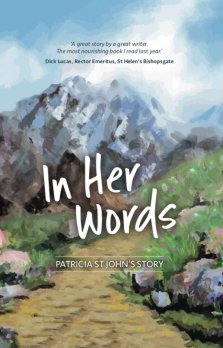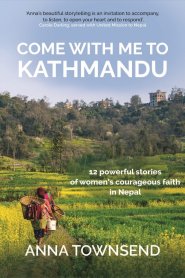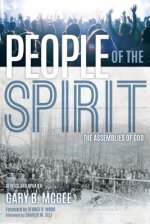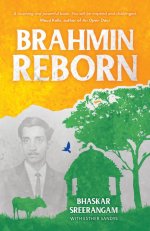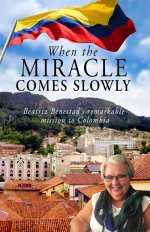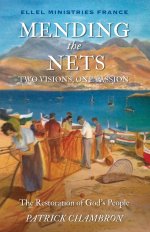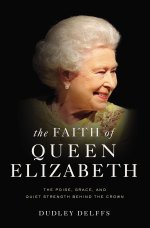Nepali women are among the most dispossessed and downtrodden in the world. Thanks to traditional customs and religious rituals, many face ordeals unimaginable to those living in the developed world.
In her new book, Come With Me to Kathmandu, Anna Townsend invites you to meet 12 women and discover their astounding stories. Poignant, shocking, but ultimately inspirational, you will be encouraged to see how God is at work in these women, changing their lives and giving them a more hopeful future.
Anna, could you tell us a little about yourself?
Where to begin? I am an Army wife, and over the past 24 years since marrying my husband, I have lived in 19 houses on three continents. Most of our time has been spent in the UK, but we have also been posted twice to America and twice to Nepal; currently, I live in Belgium. During our first posting to Kathmandu, I met a woman who changed my life, and I began Women Without Roofs.
I have two children; my son is at university in York, and my daughter is at boarding school but plans to attend sixth form in Brussels from next September. We can’t wait for her to join us here.
I grew up in a Christian family in Reading and have been part of many different types of churches due to our frequent house moves. However, one consistent part of my Christian life has been camping in the rain! I have attended Bible weeks throughout my life and have happy memories of The Downs, Stoneleigh and, more recently, New Wine. We’ll be back there next year, having missed it for several years because we were living in America and Nepal.
You have set up the charity Women Without Roofs, can you tell us a little more about this?
I’ve been running WWR for the last 18 years, which seems unbelievable to me. I arrived in Kathmandu as an Army wife in 2004 and felt utterly overwhelmed by the poverty around me. If I had been there as a missionary, I would have been in Nepal to do something useful, and I would have had some training to cope with the culture shock. As an Army wife, I was wholly unprepared, but I began to seek God about why he allowed suffering and what he wanted me to do about it.
At the same time, an elderly missionary called Eileen Lodge was also questioning God. She had been living in Nepal for fifty years and had set up various leprosy charities. A small group of men and women, primarily former leprosy patients or their dependents, had come to rely on her for their rent and medical bills. Eileen worried about what would happen to these people when she died since she was already 80 years old. God had told her that someone from the British Camp would help, so she asked me. I said yes, but I had no idea what I was getting into!
I began to find sponsors for the ladies, and when I returned to the UK to live, I registered the charity; God provided fantastic trustees to help me. Since then, the charity has grown, our central focus is still paying rent and medical bills for the most vulnerable, but we also run two women’s homes and provide money for the education of the children of those we help. While living in America, I registered the charity there also, so we are truly international now.
Why did you decide to write Come With Me to Kathmandu?
My motivations were both altruistic and selfish! Over the years, I have visited all the women we support and listened to their stories; I know that giving them space to talk and to really listen to them helps them heal. I also felt that in my short trips to Nepal, there was never enough time to hear their stories in full. When I discovered we would be living in Kathmandu again, I knew it would allow me to spend longer with the women and get to the bottom of what had happened to them.
In addition, several women had written to me over the years to share their stories; they wanted to warn other women about the dangers they had experienced. Since they believe in the power of prayer, they also desired people to intercede for them. I wanted to honour those longings, and writing a book was my way of doing this.
Selfishly, authoring Come With Me to Kathmandu is also for my benefit. Being an Army wife can be lonely. Although there are tremendous benefits and we have been fortunate to travel all over the world, very few people have been able to visit us in our overseas locations. I wanted to share my experiences with my friends and for them to ‘meet’ some of the incredible women I get to interact with. My hope is that this book will help others to know me better and understand some of my experiences. I look forward to conversations about it and would encourage anyone with questions to get in touch – even if you don’t already know me. Nepal and these ladies are my favourite topics!
Who have you written this book for?
Primarily it is for people who pray and who want to pray in a well-informed way. The issues that women in Nepal face are so massive and intractable that I believe they need to be addressed in the Spirit. Of course, I also hope the book will inspire people to take action, whether that’s by giving or by advocating for change.
God will also call a few readers to go to Nepal, and again, I hope the book provides a well-informed overview of the country’s current needs. For instance, labour laws need to be changed, there is a great need for local lawyers to be mentored and supported, and all kinds of medical staff can be of enormous help in training local workers. There are countless ways to help, and I would love to hear from anyone who decides to go to Nepal after reading the book.
You include the stories of 12 extraordinary women, how did you go about choosing these particular stories?
I chose the first eight women because I knew their stories were varied and thought-provoking. I had heard their stories before and wanted them to reach a wider audience. There were still shocks in store for me, though. For instance, I spoke with Kopisha because I knew she had lost loved ones during the Maoist insurgency, but I had no idea she had a daughter who had been killed at the hands of her paternal grandparents. Her narrative turned out to be one of the most significant incidents in the book.
I selected the last few women simply because they were available! I am confident God had a hand in choosing them, though, as their stories are incredible. I love Anita’s chapter because it is so different from the others. I am also glad I could include Ishya’s experiences working at a brick kiln. Tall chimneys are located all over Kathmandu Valley, and I couldn’t claim to have written about women in Kathmandu without including a brick worker’s experience. In the final chapter, I chose to write about a mother and daughter to reflect the next generation of Christian women in Nepal.
Many of the circumstances and cultural practices that still impact these women today seem shocking to us. Can you just give us one example of what some Nepali women have to face?
In Chapter 9, I write about Binsa. A married man deceived her and claimed to love her; eventually, she ended up having two children with him. He already had sons, and when they became teenagers, they visited Binsa and beat her up, even though she was a mother to young children. The head injuries were so terrible that she lost her mind and lived on the streets for several years. There has been no justice for Binsa. Although she knows who attacked her, these men have never faced justice, and their father has never reprimanded them. They continue living in the family home, and everyone continues as if nothing happened.
In general, male family members in Nepal continue to get away with treating women terribly; however, a few men go against the grain. I am glad I have been able to include their stories too. For instance, Lila’s brother protects her from their mother, and Maria’s son stands up for her.
Can you share one story of how God has changed one woman’s life that has really impacted you?
When I first heard Maria’s story of having to marry the man who raped her, I was angry and incredulous. The incident was such a violation of basic human decency and a clear indication of how evil has become entrenched in Nepali culture. God created marriage for good, and it should not be used to prolong a woman’s suffering and torture. Obviously, Maria continued to be abused by her new ‘husband’ and eventually ran away from him.
God knew what Maria had experienced and had plans to rescue and restore her. Although she lived in a particularly remote part of Nepal, she discovered that we were opening our first women’s home in Kathmandu. She walked for several days to catch a bus to reach us and lived at our women’s home for almost seven years; her faith in God increased daily. This has given me hope that God can turn around the bleakest and most unjust situations. Nowadays, Maria is a joy to be around and exudes such peace and trust in God.
Having heard Maria’s story, I was inspired to research other incidents of women having to marry their rapists in Asia. I am hoping this will form the basis of another book. Sadly, many women continue to suffer this way, and I would like to highlight their situations. Who knows what the impact of Maria’s story will be if I can expose other stories like it as well?
How can we pray more effectively for Nepali women?
The women and stories in my book are just the tip of the iceberg and represent many other women. I encourage people to learn more about women in Nepal by reading other books and watching films. The bibliography at the end of my book is a good starting point. In particular, I can’t recommend the movie ‘I am Belmaya’ highly enough. Belmaya is Nepali and filmed herself over several years. The resulting footage has been put together into an award-winning documentary. Belmaya’s room, clothing and household are just like the places where the ladies I’ve interviewed live. Picturing someone’s circumstances more accurately helps me to pray, and I hope it will do the same for others.
What was the most challenging element of writing the book?
I’m sure I’m not alone in feeling that the Covid pandemic presented numerous challenges. My 2020 move to Nepal was initially delayed because the wives and dependents at British Gurkhas Nepal (where we were stationed) had been evacuated to the UK. Then in 2021, we were evacuated again when the Delta variant swept through India and Nepal. The city ran out of oxygen, so it became dangerous for us to stay. Most upsetting was when my translator Saru nearly died because of the virus.
As you can imagine, completing a book in these circumstances was enormously trying and tested my perseverance. However, in the end, I returned to Nepal and continued the manuscript. Praise God Saru survived, and I have shared her incredible testimony of God’s goodness in Chapter 6.
And what was the most rewarding element of writing this book?
Before I left Nepal this summer, I invited all the ladies from the book to my house for a party. We even arranged for Maria to fly in from Solukhumbu; she had never been on an aeroplane before. My children were there too, as it was during the summer, and I was so glad they met all the women. It was fantastic to see the ladies together. We sat in our garden and enjoyed a delicious dal bhat (rice and curry) lunch, which felt so special.
I thanked the ladies for entrusting me with their stories and took the chance to tell them the headings I had selected for each of their chapters. I have chosen titles such as ‘Friend,’ ‘Witness,’ ‘Warrior’ and ‘Seeker’ to affirm their characters. There were tears as I described why I had chosen each name; I hope each woman felt genuinely encouraged and they remember the words.
Have you learnt anything new/ been reminded afresh about God/ your faith while writing this book?
Hearing the women’s stories, I was struck by God’s ability to weave stories and events together. He uses situations and people that, on the surface, appear to have nothing to do with each other to bring about his Kingdom. It’s astonishing. There are so many crazy coincidences in the book that I can’t begin to list them. The mountainous terrain of Nepal and the entrenched customs that oppress women so relentlessly are no match for him. He can still bless and reach women in the darkest of situations. It gives me faith to pray for every person and occasion where there is injustice. His work is not done, and I can’t wait to see what’s next.
What do you hope readers will most get out of reading this book?
I want my readers to fall in love with Nepal and the women there. I hope they will pray for the ladies, not through a sense of obligation or guilt, but due to heartfelt concern. It would be wonderful if some readers decided to visit Nepal, the country is hugely reliant on tourist income, but I realise many people are concerned about the environmental impact of long-haul travel. Perhaps, readers will be inspired to visit their local Nepali restaurant and build relationships with the owners. The book could be a great conversation starter.
In one sentence, how would you describe Come With Me to Kathmandu
An opportunity to meet twelve incredible Nepali women who can tell you what it is like to encounter God amid suffering.
Is there anything we can pray for you?
It’s hard to remain on an even keel when I hear so many stories of suffering and abuse. Sometimes I feel enormously sad and angry, but at other times I feel indifferent. It’s easy to become hard-hearted, so prayers that I remain compassionate would be much appreciated.
I mentioned above that I would like to write another book; I need God’s help and guidance to do that.
Trustpilot


